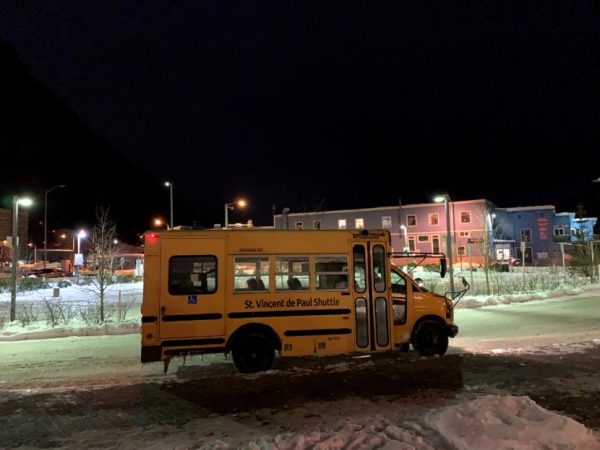
It’s the time of year when the City and Borough of Juneau starts planning for a place to house its unsheltered population over the winter.
The shelter location has moved three times since 2017, and now the city is looking to buy a building. But that effort has seen pushback from some residents who don’t want a new shelter in their neighborhood.
Right now, Juneau’s cold weather emergency shelter is operating downtown in a building that usually houses an arts and culture center. City officials moved the shelter there in early 2020 as the COVID-19 pandemic ramped up, when they realized they needed a larger building to maintain safety and social distancing.
The city could keep it there, but federal CARES Act funds are now available that would allow the city to buy a building.
RELATED: Anchorage Assembly authorizes city to purchase properties for homeless services
So the city put out a call to see if any building owners were interested in selling. Three reached out by the city’s July 28 deadline, and the cheapest was the Bill Ray Center. It’s a two-story commercial office building sandwiched between a laundromat and a bank. Valued at just over $1.1 million, the building is vacant, currently up for rent and walking distance from downtown.
The other two are the Breakwater Inn & Restaurant — a three story building that’s being offered for more than $2.8 million — and the Driftwood Hotel, which has two restaurants on-site and is worth more than $3.1 million.
The city also reached out to the neighborhood associations closest to the three buildings being considered.
RELATED: Intervention 2020 group pushes for incarcerating homeless, a plan that may be unconstitutional
That’s when Meilani Schijvens got involved.
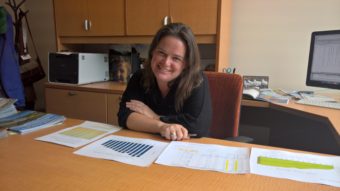
“I’m the head of the Flats Families Neighborhood Association. And, yes, I live in the Flats. I was actually raised here — so I’ve been in the Flats on and off for 47 years,” she said.
The Flats is a neighborhood near downtown that includes the Bill Ray Center.
Schijvens, who runs a local data and economic analysis company, put together a data-heavy powerpoint presentation for her meeting with the city. There’s even a graph showing seven years worth of data on how many hundreds of trick-or-treaters use the neighborhood. The presentation also points out that the neighborhood association has about 600 members.
“I tend to think visually, so I wanted to come in with some sort of visual slides so that those who were thinking about moving forward with the Bill Ray could sort of really easily visualize how close the Bill Ray is to schools and playgrounds in the neighborhood,” she said.
Schijvens said it’s a dense residential neighborhood, with “seven schools and six playgrounds that are all kind of just really clustered in that area.” Schijvens also calls the Flats the “world’s most kid-friendly neighborhood,” with about 1300 children attending school there.
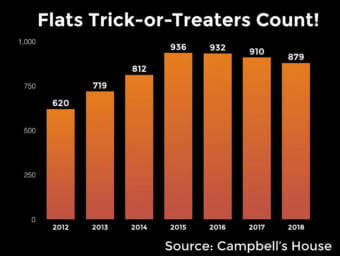
Ultimately, Schijvens questions whether the Bill Ray Center is the best location for a cold weather housing shelter because of all of the children nearby. She called two other places in town to see if those building owners would be interested in selling and suggested them to the city as better locations.
She said she also asked the city manager to extend the deadline for building owners in town to offer their properties up for sale. The city did that — now the deadline is August 26.
Schijvens said that, although she does head up the neighborhood association, she doesn’t speak for everyone in the Flats.
When asked why it’s a problem for children to be near people experiencing homelessness, she said homelessness is not monolithic — there are a lot of reasons why people may end up unhoused. But in her view, the people who are using the cold weather shelter are generally not allowed in the Glory Hall or in other types of housing the city offers.
“Because of significant drug use or significant mental health issues, maybe because of overcrowding of those facilities or maybe choice. But it ends up being a different type of homeless population,” she said.
Schijvens said she has a lot of compassion and sees a lot of compassion from her neighbors for the vulnerability of people who are unsheltered. And she’s intimately familiar with some of the issues with social services available for people experiencing homelessness in Juneau.
Her firm has done economic and social impact analysis of the new Glory Hall, a project that would see the downtown homeless shelter moved several miles away to a spot near the airport. Organizers are trying to make it a “one-stop-shop” of sorts for people who need shelter and access to other social services.
“I was hired to do it, and I think I got about five minutes into the project and then I was like, ‘there is so much need here, I am definitely not charging for this project,’” she said.
And she learned some things she wasn’t aware of before working on that project.
“I didn’t really appreciate how extensive the needs are of the homeless community that’s currently using the downtown Glory Hall — that aren’t being addressed,” she said.
When it comes to another cold weather shelter, Schijvens said she wants to make sure the city is considering all of its options.
Outside of the Glory Hall shelter downtown, Dave Lane digs through his things to find a scarf for a friend who’s in a rush to catch the bus. Lane finds what he’s looking for, hands over a thin blue-grey scarf, and the man rushes away.
“He needed a leash to get his dog on the bus,” Lane explains. “That scarf will be a perfect leash.”
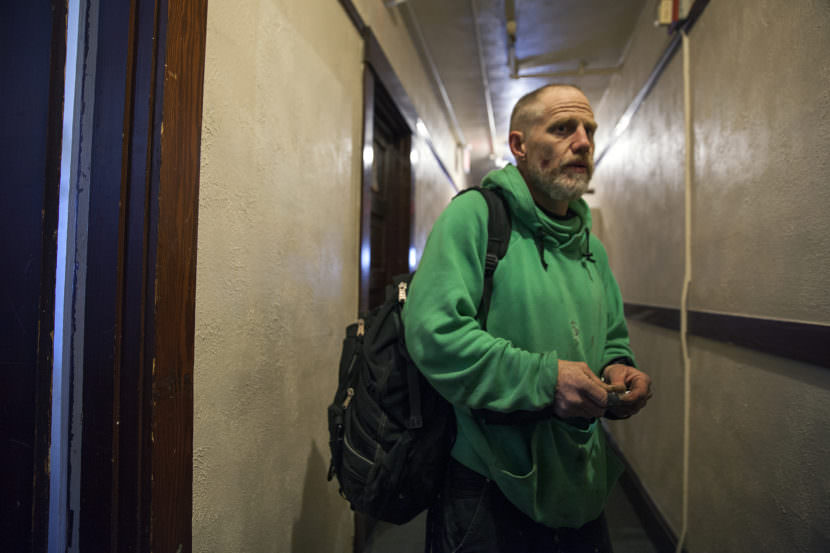
Lane uses the cold weather emergency shelter.
Before last winter, he would have said any cold weather shelter should be near downtown, because that’s where a lot of people who use it live. But last winter the city contracted with a different provider, St. Vincent De Paul, and the shelter was miles from downtown, near the airport. It wasn’t as hard to get there as he thought it would be.
“I was surprised at how well it worked in the Valley. I was impressed with the ability to get the homeless — who obviously don’t have the means themselves — to get there,” he said.
Shelter staff would drive around town with a van, offering rides to people at night. Lane said it was easy to hop in, get a ride over and get a hot meal.
And he is surprised by the news that the city is considering purchasing a building for a new shelter. But he’s not surprised that people are pushing back about where it could be located.
Lane said a lot of times people in Juneau are compassionate right up until it becomes clear that they’ll have to be close to a homeless population. Then, he said, it becomes an argument of “not around me, not in my neighborhood.”
Lane said that mentality isn’t compassionate, and it divides people. He said he understands the frustration that business owners in downtown have and the pushback against people living on the sidewalks.
“They don’t want this place to look like a hobo town. But it’s not. And if their passion, compassion to some of these people would exist — these people wouldn’t exist how they do,” Lane said.
He said he knows when he’s being judged just for being seen, and it doesn’t make these conversations about social services any easier. It makes people defensive.
“Fighting a battle of ‘keep them out of my neighborhood’ or just any form of the abrasiveness, as soon of most of the people feel that, they’re going to be more uptight,” he said. “They’re going to be rougher.”
Lane also pushed back against the idea that homeless people shouldn’t be near children. He fears that if kids are shielded from that reality, another generation will grow up with no tolerance.
“I would much rather have children walk by and not even see us in the sense of … it’s common, it’s normal, I’ve been around that my whole life,” Lane said. “I want them to be compassionate.”
Lane also said he doesn’t understand why the city reached out to neighborhood associations but not people actually using the shelter.
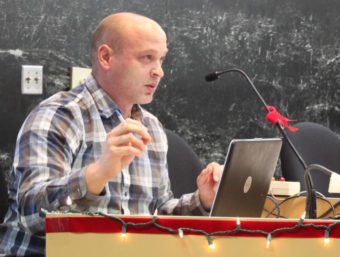
The city’s Chief Housing Officer, Scott Ciambor, said his office didn’t reach out to people experiencing homelessness. They met with shelter providers and neighborhood associations. But he also said it’s early on in this process.
Ciambor said there will be a robust public process with multiple opportunities to speak — including to the city assembly, which will have the final say over how money is spent on the shelter program.
Lane said the city should put up fliers at the Glory Hall homeless shelter and other places in town where people can see them.
“And then get people at least to think about it. You know now whether they’re actually going to get riled up and passionate and get to the meeting — at least have the opportunity to,” Lane said.
The city has received a handful of other letters of interest since it extended the deadline — including one from the owner of the JMA building, which is about 8 miles from downtown.
The city has not yet scheduled another meeting to hear from the public about a new shelter.




